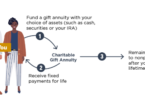Maximizing your charitable tax deductions requires careful planning and adherence to IRS guidelines. Here are steps to ensure you get the most benefit from your charitable contributions:
1. Choose a Qualified Charity
- Ensure the organization is a registered 501(c)(3) nonprofit.
- Use the IRS Tax Exempt Organization Search Tool to verify the status of the charity.
2. Document Your Donations
- Cash Contributions: Keep bank records, canceled checks, or a receipt from the organization.
- Non-Cash Donations: Obtain a receipt detailing the items donated. For donations over $500, you may need to complete Form 8283.
- Time Contributions: While you can’t deduct the value of your time, you can deduct expenses incurred while volunteering, such as mileage or supplies.
3. Consider Donating Appreciated Assets
- Donating stocks, bonds, or other appreciated assets directly to a charity allows you to deduct the fair market value and avoid capital gains taxes.
4. Take Advantage of the Standard Deduction Rules
- If your total deductions (including charitable donations) don’t exceed the standard deduction, you won’t benefit from itemizing. For 2023, the standard deduction is:
- $13,850 for single filers.
- $27,700 for married couples filing jointly.
- Consider “bunching” donations: combine multiple years’ contributions into a single tax year to exceed the standard deduction.
5. Track Mileage for Charitable Work
- For 2023, the IRS allows you to deduct 14 cents per mile driven for charitable purposes.
6. Understand Contribution Limits
- You can generally deduct up to 60% of your adjusted gross income (AGI) for cash contributions.
- Lower limits may apply for non-cash donations or contributions to certain organizations.
7. Use a Donor-Advised Fund (DAF)
- A DAF allows you to make a large contribution in one year (to maximize deductions) while distributing funds to charities over time.
8. File the Correct Forms
- Attach Schedule A to your tax return to itemize deductions.
- For non-cash donations over $500, complete Form 8283.
- Donations over $5,000 typically require a professional appraisal.
9. Stay Current with Tax Law Changes
- Keep informed about updates to IRS rules or temporary provisions like enhanced deductions that may apply.
10. Consult a Tax Professional
- A CPA or tax advisor can help you navigate complex rules, ensure compliance, and identify strategies to maximize your deductions.
By planning carefully and staying organized, you can maximize the financial impact of your charitable giving while supporting causes you care about.
Also Read :







Leave a Comment